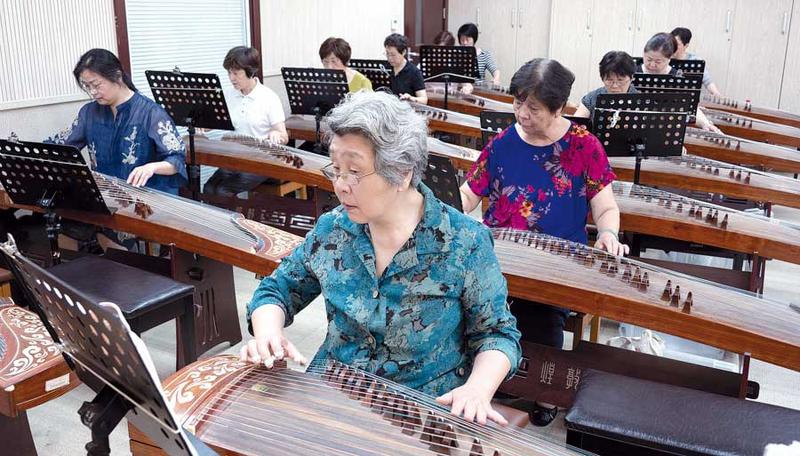Editor's note: As the Chinese government responds proactively to population aging, the country has adopted policies and fostered a social environment in which senior citizens are respected, cared for, and live happily in their later years, writes a veteran journalist with China Daily.
 Students learn to play traditional Chinese musical instruments at a school for the elderly on Nantangbang Road in Shanghai. (GAO ERQIANG / CHINA DAILY)
Students learn to play traditional Chinese musical instruments at a school for the elderly on Nantangbang Road in Shanghai. (GAO ERQIANG / CHINA DAILY)
When I heard on the radio that peach and magnolia flowers were in full bloom in the Summer Palace and its Kunming Lake had visitors in the shape of migratory black swans, I lost no time and boarded a bus for the "Imperial Garden Museum" located about 20 kilometers from my home.
With my senior citizens' card, I got a free bus ride to the Summer Palace. Using the same card, I entered the garden for free. The views were beautiful, the atmosphere lovely and the trip relaxing. When I returned home late in the afternoon, I realized that I hadn't spent even a penny on the trip — I had a lunch box packed at home.
We should keep in mind the old Chinese saying: The elderly who don’t respect themselves are not respectable and should not be respected
Millions of retired people in China travel on buses, and visit parks, museums and scenic spots each day for free using the senior citizens' card. In fact, about 90 percent of the passengers on the bus and visitors at the Summer Palace were elderly people.
The above benefits are just part of the welfare the elderly people enjoy. Pension has been increased at the rate of 4-5 percent annually for 19 years, medical insurance now covers more than 96.8 percent of the elderly population both in urban and rural areas, and thousands of more affordable nursing homes are being built.
Statistics show that by the end of 2022, more than 14 percent of the Chinese people (or about 267 million people) were aged above 60. Since the number is equal to almost 80 percent of the United States' total population, one can imagine the level of challenge the Chinese government faces in providing care for its senior citizens.
Therefore, as elderly people, we should be thankful to society and exercise more self-discipline to become role models for the younger generations.
Unfortunately, we still read or hear reports about the uncivil behavior of some senior citizens. One media report said that hundreds of walkers in a city in Central China, unsatisfied with exercising in a park, were walking down the streets and blocking the traffic. When stopped by the police and pedestrians, they claimed their freedom was being curbed.
In another incident, photographs and video clips show a group of elderly people making obscene gestures while dancing in a park in a Northeast China city. Parents passing by had to cover their children's eyes to avoid embarrassment. When the park administrators and the police tried to interfere, the elderly people claimed their rights were being violated.
Senior citizens dancing to loud music in community squares has long been a source of noise pollution in cities. There have also been reports of disputes between elderly dancers and local residents, especially youngsters, because the elderly group invades community basketball courts or parking lots and uses them for dancing.
Even on planes and trains, some elderly people occupying the seats of other passengers refuse to shift to their assigned seats. On buses, cases of elderly people slapping younger people in the face just because the latter didn't offer their seats to them have been reported.
I was left speechless when I saw people of my age climbing up peach trees in the Summer Palace and shaking the branches so they could click good pictures of falling flowers.
And when two elderly women were caught trying to steal two geese from a park in Beijing earlier this year, people severely criticized them for it. Some social media users even asked whether "bad people" were getting old, or "old people" were acquiring bad habits.
The Chinese people have a long tradition of respecting the elderly. To better protect the rights of the elderly, the country passed a special law in 1996. Since then, the law has been revised four times to add more teeth to it. Apart from the law, Senior Citizens Day, Mother's Day and Father's Day are also observed in China.
Living a happy retired life, we elderly people should mind our behavior to earn respect. We should keep in mind the old Chinese saying: The elderly who don't respect themselves are not respectable and should not be respected.
The author is former deputy editor-in-chief of China Daily.


